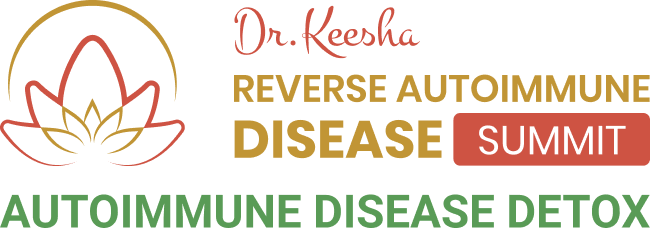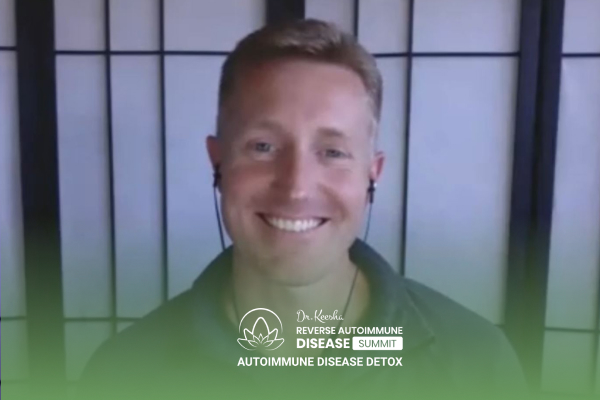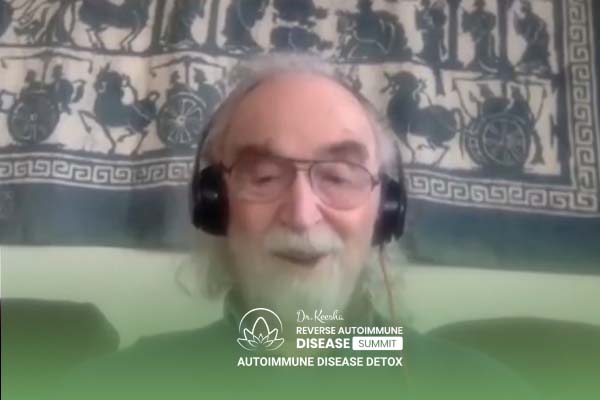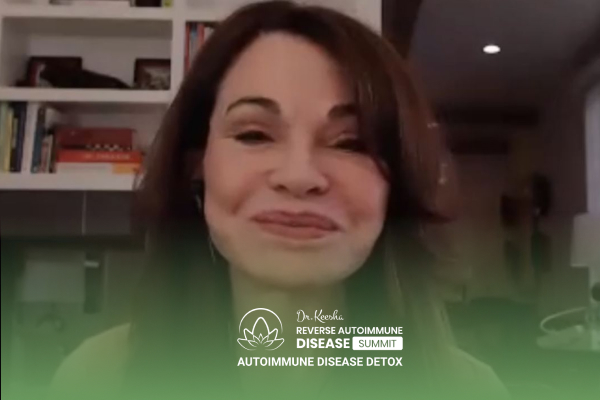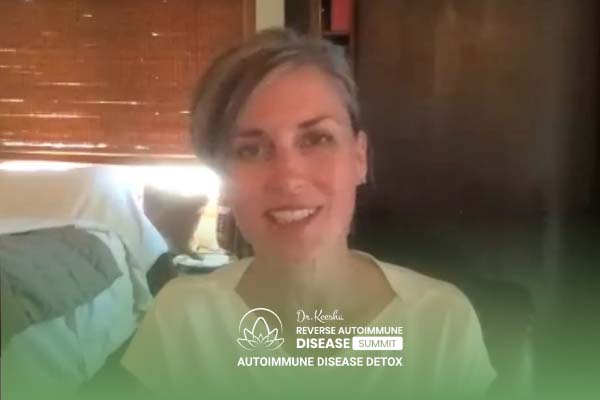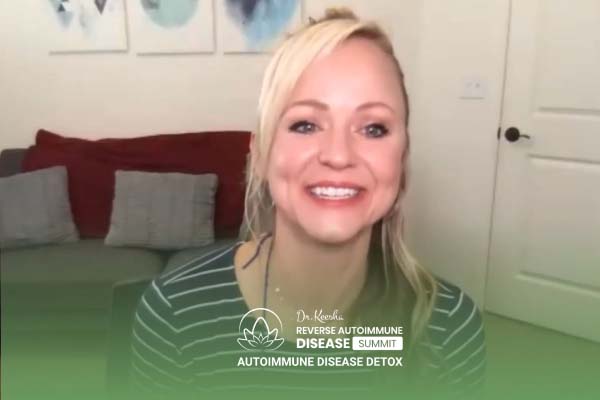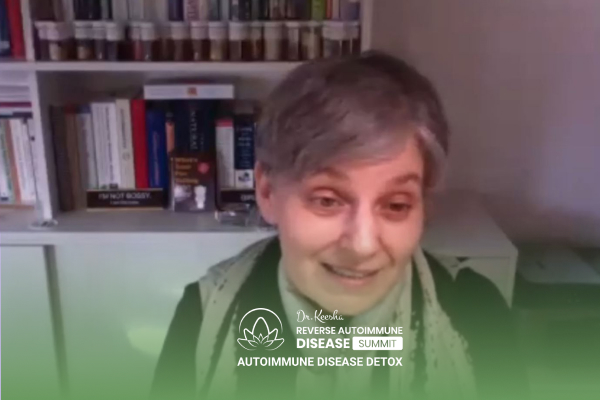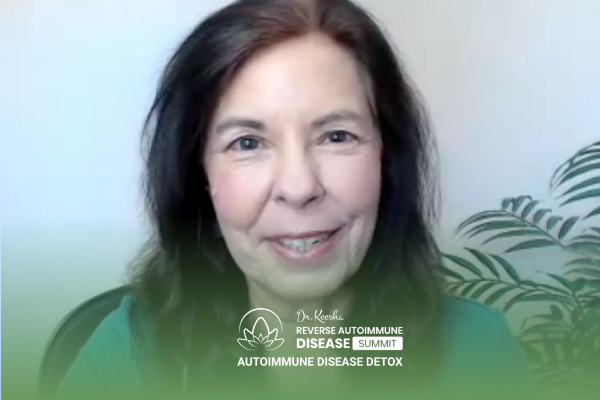Join the discussion below
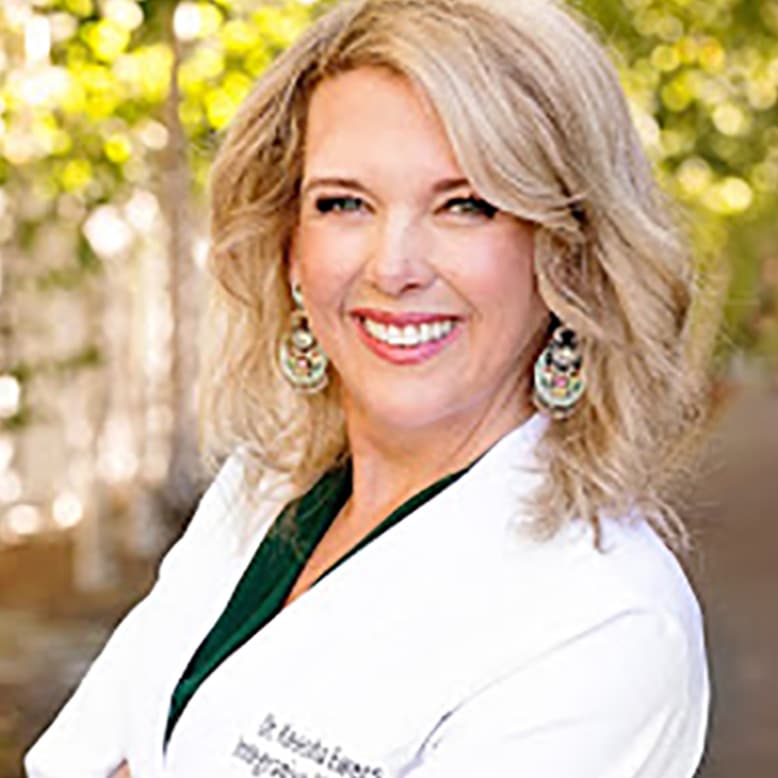
Keesha Ewers, PhD, ARNP-FNP-C, AAP, IFM-C
Dr. Keesha Ewers is an integrative medicine expert, Doctor of Sexology, Family Practice ARNP, Psychotherapist, herbalist, is board certified in functional medicine and Ayurvedic medicine, and is the founder and medical director of the Academy for Integrative Medicine Health Coach Certification Program. Dr. Keesha has been in the medical field... Read More
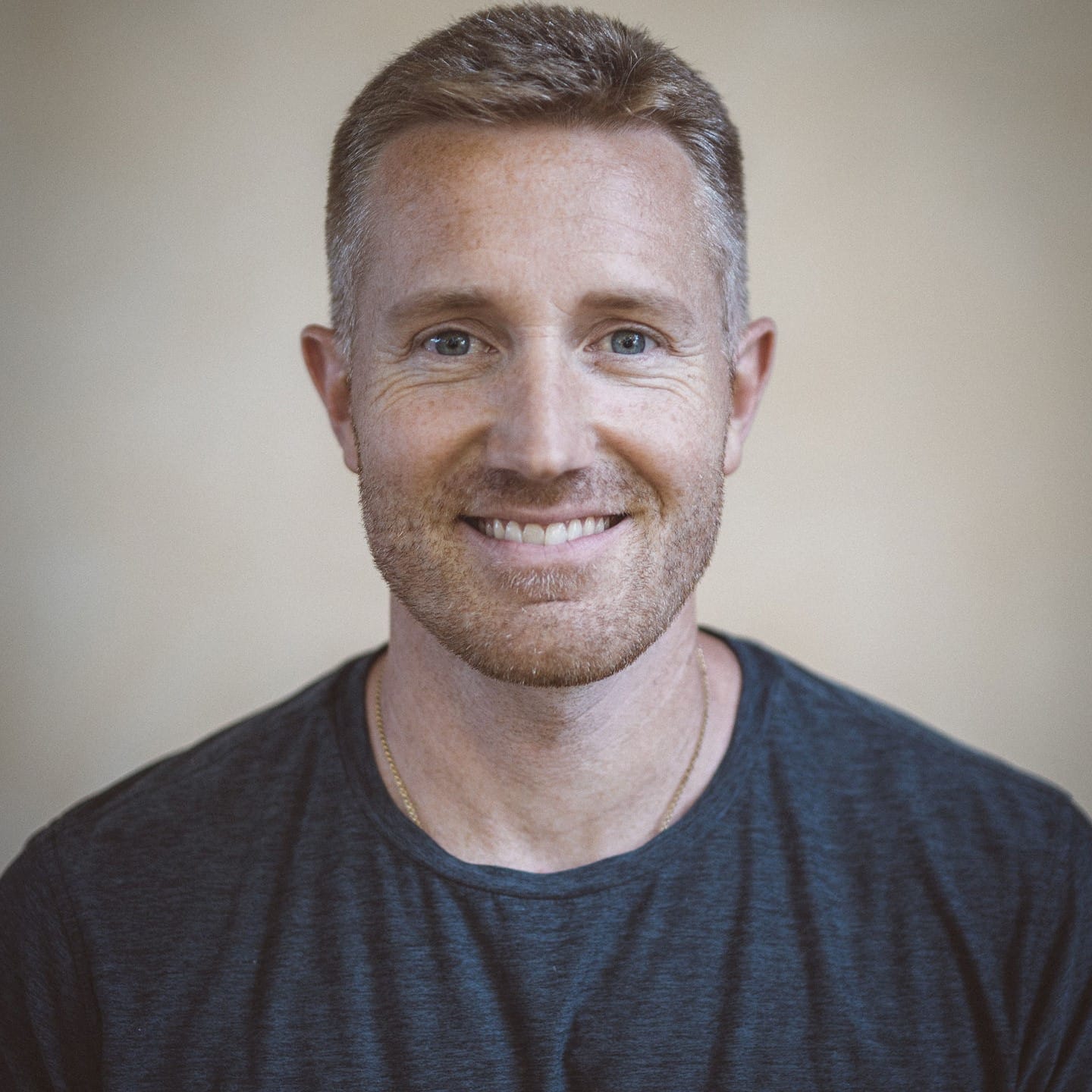
Jason Prall is a health educator, practitioner, author, speaker, & filmmaker. In 2018, his independent research and experience led him to create "The Human Longevity Project”, a 9-part film series that uncovers the true nature of chronic disease in our modern world. He’s currently finishing his first book titled, “The... Read More
• Undigested Anger, how to identify and process it to help reverse autoimmunity
• Alignment is the key to autoimmune detoxing
Keesha Ewers, PhD, ARNP-FNP-C, AAP, IFM-C
Welcome back to the reverse auto-immune disease summit series, everybody. I’m Dr. Keesha. And of course, you’re joining me for the fourth and the iteration of this reverse auto-immune disease series. We’re talking about the auto-immune detox. And you know whenever we’re talking about reversing autoimmune disease we’re saying each one of us has an individual puzzle. There are four corner pieces to every single puzzle that we are solving. And when we’re talking about auto-immunity, we’re talking about your unique genetics, your unique gut health, your unique past trauma, current day stress and then your toxic burden whether it’s spiritual, mental, emotional, physical and then your ability to rid yourself of those toxins. So that becomes the maloo and what to you and autoimmune disease are in relationship. And then we can get that changed, be out of relationship with that autoimmunity. So my guest today is Jason Prall, who is a health educator practitioner, an author speaker and a filmmaker. 2018, his independent research and experience led him to create the human longevity project, which is a nine part film series that uncovers the true nature of chronic disease in our modern world. He’s currently finishing his first book titled “The Longevity Equation,” as well as his next film series that explores ancient methods of healing, mind, body and soul from indigenous cultures around the world. Welcome to the series, Jason.
Jason Prall
Thanks for having me. It’s always a pleasure.
Keesha Ewers, PhD, ARNP-FNP-C, AAP, IFM-C
So we were talking before we hit record and you said I’m kind of a big picture guy. And when we talk about autoimmune disease, there are some larger concepts at play and I would love to have you point to those.
Jason Prall
Yeah. I think when we think about autoimmune disease or any chronic issue, there’s so many levels to what’s going on, right? And you mentioned a lot of them in the opening and this is what makes it so challenging is ’cause you’re trying to figure out as somebody that’s dealing with this, what is it that I need to hit on? And generally the reality is it’s many things, right? It’s multiple aspects. And when we went around the world for a recent film series, we visited Dr. Fasanolad in India to talk about Ayurvedic and Ayurvedic wisdom. We went to the Himalayas into Nepal and worked with some Buddhist and bone healers there. And we went to work with some shamans in South America.
And there’s something that kind of emerged when we spoke with all these very wise individuals who work on many many levels beyond just the physical and it’s that these things aren’t just in this physical mental reality that we typically like to think about things in the West, they go into another realm. Another aspect of our being if you will, that is there that is out of balance where that is holding onto something that is unprocessed, right? And this is the common theme that we see is that there’s nothing wrong with us. I’m sure we have constitutions and we have alignments that are our own. That said, these things are not broken. And it’s generally speaking it’s something that’s kinda stuck that it’s unmetabolized undigested in our being.
Now this can be in our sort of etheric self, our soul level, if you will, or spirit level. However, we wanna think about that but the non-physical levels of ourselves. It can also be in showing up in the physical, right? So it can literally be our digestion is not optimal. So generally what we see is that these things are reflected in multiple aspects of ourselves. It can be undigested mental processes. We can’t, we keep thinking the same things where we keep believing the same belief patterns. So it’s interesting to note that when you find these things it’s probably not just in one level that it’s taking hold of that it’s manifesting it’s on multiple levels. And that’s generally where I see the shamans and the Ayurvedic practitioners and Chinese medicine and some of these indigenous cultures they tend to recognize that a little bit more frequently than we do here in the West. And they have different ways of working with them that I think go beyond what we typically like to think of here.
Keesha Ewers, PhD, ARNP-FNP-C, AAP, IFM-C
Yeah. Yeah. It’s not often that you’re gonna hear that there’s a soul retrieval needed for your autoimmune disease.
Jason Prall
And look, the processes are very strange, right? To the Western mind. I grew up in the scientific world. I was a mechanical engineer. I did science classes. I was a prove it, you gotta prove things to me in order for me to believe them. And the things in the way that they do things in those cultures and in those practice, very, very strange. And so to some degree, it actually takes a little bit of letting your guard down opening up to that level of reality to even be able to work in those realms. We are so powerful as beings that we can actually block the healing or the alignment or the movement of this stuck energy. And so on some level we’ve gotta be open to these things. And so it’s very interesting when you see them. I just wanted to note that if you go look at some of this stuff, it’s like, what the heck? I mean, I had eggs rubbed all over me and prayers and soul retrievers, and it’s like this is strange, strange stuff, but just being open to it kind of allows for a new reality to emerge.
Keesha Ewers, PhD, ARNP-FNP-C, AAP, IFM-C
I love the egg healing. So rubbing eggs all over you and then dropping it into the glass of water and watching the pattern, right? And reading that
Jason Prall
It’s like reading the tea leaves, but you’re doing it with egg yolk and the white in a glass of water. Very strange, but cool nonetheless.
Keesha Ewers, PhD, ARNP-FNP-C, AAP, IFM-C
So when we’re talking about digesting an emotion, that was something that was new to me. So when I was diagnosed with rheumatoid arthritis I was just shortly after 30. I read that Ayurvedic medicine actually sees as undigested anger. And I remember thinking, wow, this word putting digestion in front of an emotion is something so alien to me it’s so foreign, like what? And also a denial inside of myself that was instantly defensive. I’m not angry. Yeah and just a lack of self-awareness and being able to witness what you might think of in common union parlance, your shadow self, or a part that you don’t want to have near you. And so disown and say, I’m not angry, right? I’m not allowed to be angry. My cultural story has been that anger is bad. And therefore, so then how do you proceed with that inside of our culture with a diagnosis of auto-immunity knowing all of that?
Jason Prall
Yeah. I think there’s some interesting language choices that we can use. And one of them is to instead of saying, I am angry, right? Which is sort of, you’re really identifying with the anger. You can actually sort of shift it into, I have anger, right? And I feel angry and that’s a totally different thing to be able to feel anger. That’s actually important. We don’t wanna suppress anger. If we have this anger within us then we want to express that. We want to sort of be it for a moment. We want to move it through. That is actually the point is that if you’ve got stuck anger and you say, I’m not angry then you actually just holding on to that, right? And so just recognizing that you can have these things you can experience these things and you can feel these emotions is important and these emotions are critical and we are right to feel them, right?
A lot of the emotions that we suppress or that we don’t even recognize that we are holding onto are there for a good reason. And generally in childhood, not always, but generally speaking, we go through these experiences and we lack the resource to be able to move through them optimally, right? In other words, when we’re two and three and four, we don’t have a great ability to digest these very strong experiences on our own so we rely on others, generally, caregivers, mother mostly father, as well even grandparents, perhaps, even siblings. These beings that are around us who are more developed and generally more capable are hopefully able to help process these things for us, right? This is often when you see that a newborn or young child going to mom’s breast, very very easy way to reset the system, right?
To get back into this rest, digest, calm, nervousness and say that is a direct reliance on the mother to be able to get into that state. Without that baby goes nuts and remains in a sympathetic state, I’m gonna die. I’m not okay. And the baby doesn’t know this it lacks the resource to understand these things on a sort of mental, emotional level, right? We are cognitively very underdeveloped as children, right? Because we’ve gotta come out we’ve got these big heads, gotta come out of mom. And so we are cognitively underdeveloped. ‘Cause we have to develop these faculties which means we need resources from others to understand what’s happening. So if we don’t have that resource available to us and look on some level, none of us do, right? There are certain things that we just don’t get. Now sometimes we have things that we can work through but things get stuck. We are unable to fully work through them. And so these things we carry with us until we find the resource either within ourselves or generally from other people around us and this can be athletics coaches, this can be teachers even this can be a lot of different people that can provide this resource.
Friends can fill this role, but well as well, as well as your partners, they can help provide these resources and we can start to metabolize these things but a lot of times things get stuck. And they’re there and they need what they really need is care and support. And somebody that can offer that in a sort of way that is without any judgment, without any agenda. It’s a loving presence that has that. And again, this is what the shamans do. This is what a lot of people, they are Ayurvedic practitioners who are really good at this. They can get in there. There’s a lot of different practitioners that are capable of providing this as a resource. But all of us go through our formative years with undigested underdeveloped processes. And so we have these within us. It’s just a matter of recognizing what’s there and honoring that.
And really seeing that. If I have anger there’s a reason as a two-year-old that I might be angry because somebody was not there for me, something happened. And so there’s all kinds of these things that are there. And then of course, if we don’t if we have not digested this and not sort of grown up, not developed in that way, then anything that’s gonna happen in the future, that’s gonna trigger that, it’s gonna bring that to the surface, it’s just going to sort of magnify within us. And there’s a reason for that. It’s sort of pointing us to an aspect in, Hey, there’s stuff here. We need to move this through. And that’s the opportunities that we have as we get into adulthood is to recognize these things, find these things and hopefully find the resource in practitioners like yourself, Keesha and others who know how to work with these, identify them, help work with them. And then you can move these through. And it’s a matter, unfortunately sometimes it is not comfortable to feel these things. You actually have to feel the anger. You have to feel the sadness. You have to feel the disappointment. And I don’t know about you but I don’t like feeling disappointed. I mean, there’s a big theme in my childhood. And it happens over and over again to me today. I’m still working this disappointment side and that is gonna continue to rise until I find the resource to be able to move that through fully.
Keesha Ewers, PhD, ARNP-FNP-C, AAP, IFM-C
You’re sort of flying in the face of something that I just talked to Sherry Clark about in an interview today about detoxing old belief patterns so that you can live the last half of your life, from a more conscious state. And one of the things that I was talking about is what I’m calling that I call and I’ve probably other people have too but the tyranny of positive thinking
Jason Prall
The Joe Dispenza effect. I kid, I kid
Keesha Ewers, PhD, ARNP-FNP-C, AAP, IFM-C
The tyranny and positive thinking is the opposite. It’s the thing that says you’re not allowed to feel sad. If you feel anger, get rid of it. The more that you feel that emotion you’ll manifest more of it. And that is I heard something in nondual context. Shaivism one time that said, it’s an enemy of the truth because it’s a near enemy, right? It’s almost there.
Jason Prall
That’s the hardest part, right? It sounds so good.
Keesha Ewers, PhD, ARNP-FNP-C, AAP, IFM-C
But the step that’s missing is actually the allowing of the feeling and the emotion. So it can actually move through your body and what they’re saying is correct, yes you want to ultimately have that clear aligned, open channel, where you’re a channel from the earth to the cosmos and everything moves through you, but there’s a process that your child self has to go through. And the stuck diseased piece is actually a map showing, Oh yeah, there are places here in this body where there is some stuck undigested emotion belief, experience, memory, that needs to be processed and moved through. And you can’t just hop over the top of it, like spiritual bypass, right? You’re going to leave it left in there because your mind has decided it’s done, it’s moving on. But the body’s like, wait, wait.
Jason Prall
Okay. Well and I think, where we get caught is that it’s in the judgment of the experience, right? Again even I caught myself here in a trap which is to say that I don’t like feeling disappointment. Well, that is in itself a judgment. Now it could be a level of truth. And at the same time, as I wake into greater levels of reality, then why is this sort of disappointment any better or worse in the grander truth of an experience, rather it’s just an experience. And so what I find helpful here is that there’s a lot of ends here, so I can feel this point but I don’t really enjoy disappointment. So in other words, I would prefer not to feel disappointed and perhaps I can learn to recognize that that’s just an experience as well.
So not to judge it too harshly. I think, again, going back to the and if we have these trapped or stuck emotions, energies, beliefs, thoughts, et cetera that are in our psyche, that are in our emotional body and the physical body, perhaps and I’ve had experiences where things have cleared and I didn’t have to go through the pain or the agony or the challenge, things just cleared. And I had no content for what it was but I could feel the energy moving through. And I’ve had other times where I’ve actually had to feel really deep anguish. And so perhaps we can leave room for whatever shows up but that’s to say that, in some of the most difficult experiences that I’ve had in clearing some of these things that have been stuck within me there’s actually a process that goes for me, has gone through horrible agony to the depths of just feeling pain.
And then as I’m moving through it, I’m actually in real time having an awakening, an understanding, a realization, not from the mental side of things. One I’m speaking of directly as a heart wakening where I was feeling the agony and the pain of why are we so awful to each other as humanity. There’s so much war and disease and destruction and all this awful things, why are we doing this? Right? And you can see that right there is a judgment. It’s me judging the world’s experience, humanity’s experience as a collective. And as I’m moving through this deep pain of all the horror and atrocity that we’ve committed over the ages, I have this natural, real awakening of, oh that actually has to be that way. This is our development. We are moving from infancy into adolescence so to speak, we’re learning, we’re understanding and we’re growing through this. And while it’s not pleasant on one level, it is necessary and it’s beautiful. And then as I continue to move this stuck energy through the heart awakened further, and I realized, wow, this is beautiful.
This is how this is the way it has to be. This is sort of God’s design this is the ultimate plan. Who am I to be judging this? This is grand. This is beautiful. And then my heart are woken even further and I recognized what a gift that it is for us to forget who we are and the grand nature of ourselves, it’s the ultimate gift. And so that for me, was an experience of moving through that pain and agony and horror. And I literally felt it within my emotion within my body it was awful and the awakening occurred as it moved through. I had no plans for this. I had no idea what was coming. I was just going through a sort of healing experience. And so that for me, shows me the powerful nature and why it was important for me to go through that. So I think we can save room for all of it. And sometimes we can have the blissful new awareness and we don’t need to revisit the old. And sometimes we must revisit the old, it is the only way forward. And sometimes hardly can tell anything’s happening.
Keesha Ewers, PhD, ARNP-FNP-C, AAP, IFM-C
What I’ve found in those moments, when we’re having to revisit it’s because I’m having to recognize my own role. And the thing that I’m upset about, like, Oh how have I been awful and terrible as a human, instead of judging all those other humans who are just not quite as advanced as I am, if they only thought like I did it, we would be fine.
Jason Prall
Exactly. Yeah. There’s something there’s nugget there for you, right? And that’s so important.
Keesha Ewers, PhD, ARNP-FNP-C, AAP, IFM-C
Yeah, yeah, yeah. Yeah. Another way that, you know, I think this sits next to my computer. And so this is little me and I can feel the feels right? The emotions, and I can recognize who’s feeling them. So if it’s abandonment, Oh baby, that’s you, right? It’s not this version. It’s this little one who actually needs some really tender care, needs some very deep love from me, some attention from this version, this wise version of me that needs to go pick her up and fold her in and say, Oh, but I am not leaving you. I am right here, right? And so it’s like really regenerating the I don’t know the timeline that says you’re born and then you die. And it’s in a straight line to all of us. All of our versions are available in one little cell of time, right? And we can access any of them, the really ancient one and the really little one. And it’s usually the little one that when we’re really upset that’s the one trying to get some attention, right?
Jason Prall
Yeah. And going back to some of these indigenous and ancient cultures, the way that they think about the human being is so much bigger and grander than we tend to in the West. And one of the shamonic perspectives is that we are so essentially fragmented, right? The larger aspect of ourselves is literally in different dimensions. It’s all over the place. And the thing that sort of causes that, well, first thing is you’re being born. So that’s one of the things, but it’s any of these little, what we would call traumas, read these big experiences that sort of fracture our being. And this seems to be an accurate way to describe what we’re actually like here as adults is we have these little pieces all over the place, right? And I got a part of it here and a part of it there and a part over there. And I got my little two year old part that got fractured off because of this thing that happened all the time regularly then I have this little four year old part that got fractured off, so to speak and developed its own little character identity because something really traumatic and big happened. So we have all these little parts and pieces and they tend to show up when certain things happen, right? If we lose our job, right?
And it’s a pretty big thing as an adult it’s not the end of the world, but it can feel like it because there’s a lot of things, a lot of ramifications, well, that might trigger a six year old part that felt the same way. So now the six year old version of me shows up and I start behaving like a six year old and a brilliant sexual, but mind you because I developed these strategies to get through that, but nonetheless, a six year old. And so if we can start to see ourselves not as the one who is angry or depressed or has autoimmune disease but rather there’s actually fractured parts and pieces then I can become disidentified with the four year old or the six year old when he shows up, right? And I’ve had plenty of moments daily that these ones show up. And so if I can just recognize, Oh, that’s a part that’s showing up. I don’t know which part that is, but I know that’s not the full grownup adult developed big whole soul me.
Keesha Ewers, PhD, ARNP-FNP-C, AAP, IFM-C
Right the skillful part of you.
Jason Prall
And so, but we can hold space for that, right? And I can tell ya, I’m just caught in a part. I’m literally 100% identifying as a six year old right now. That’s how I’m feeling. In fact, before we got on this call, I expressed to you I was kind of in a part and I was feeling and I still am feeling this thing because my family’s away from me for a little while. And it’s bringing up all kinds of abandonment stuff and just general sadness.
Keesha Ewers, PhD, ARNP-FNP-C, AAP, IFM-C
And I was filling my mother part come out. And I was like, I hear, we gotta start that we gotta start considering. Otherwise you’re about to get mothered on.
Jason Prall
Right so this can control. This can run in the background right? Of my everyday experience. And I can ignore it as much as I want. And I can pretend to put my big boy pants on and do all the things that adult me would do. And yet I’ve got like a six year old running the show. And so when this is the case, this is reflected in the things that show up for us in life whether it’s support from others, whether it’s sort of these, you might even say fortunate events, they are also sort of influenced by this. But speaking directly about this topic today, it shows up in the body, right? So it’s showing up in how our heart is functioning how our liver and our kidneys and our adrenals and the thyroid and the brain, everything is being affected because it’s all essentially the first point of contact that we can think about anyway is the nervous system.
It’s reflected throughout our cellular architecture and intercept your space. So it’s everywhere, but it can primarily be recognized as the nervous system. And so this will affect everything. It affects how we sleep. So it has multiple layers of fact, right? Direct effect. Then it’s gonna change our eating patterns. It’s gonna change whether we drink alcohol or smoke cigarettes or do drugs, it’s gonna change how we treat other people which then has a bounce back effect. It’s gonna affect our sleep directly. In fact, I couldn’t sleep very well last night. So not having sleep will then have another effect on the body. So you can see that this thing gets really complicated really fast and there’s so many effects going on and ultimately it’s all being driven by these parts that are kind of running the show for us. And now they might be five or six ones all kinda working together to keep me stable. You know what I mean? And I’ve got all kinds of parts popping up to just keep the ship aligned.
So it’s pretty wild. And the more that I get in touch with these, the more I recognize them the more I feel them, honor them not judge them. And I can find support for them. Then literally these things start to get metabolized and digested and the four year old grows up a little bit, right? And so this is what happens and so many parts of us are stuck at young ages. So it’s like me, the adult and I’m dragging behind me like a thousand little me’s that are stuck at different ages and it’s quite a weight. And so again, they’re there and I wanna honor them but the first piece is to recognize that they’re there and then hopefully be able to work with them, metabolize and digest some of this stuff so that we can fully come into being as a present adult that is developed.
Keesha Ewers, PhD, ARNP-FNP-C, AAP, IFM-C
And in the shamonic world, you sort of drag behind all these parts of me, right? In the shamonic world, they talk about soul retrieval. And it wouldn’t be like the Abrahamic tradition of the soul that we think about. They’re actually talking about these little kid parts, these parts that got an innocence that got broken off in that moment that got left behind for safekeeping, right? So that it’s, like it’s there because it was too much for that little one psyche to manage, right? And the nervous system is the part that actually goes beyond our physical structure. We know this, right? We know the chakra system exists because we’ve had it in photographs now. And so that connects our emotional mental and spiritual bodies to us and it impacts our genetics, our organs, right? Our immune system, everything. So whatever we’re thinking feeling is actually influencing genetic expression through the nervous system which is why it becomes such an important piece. So this idea of soul retrieval being something woo woo, It is not. It’s going and getting that little one and going, come on. Yeah. Let’s come back in.
Jason Prall
Yeah. And I wanna share an anecdote here ’cause it’s I think it’s very relevant and it’s interesting. So a lot of times when we metabolize or digest these pieces that are stuck or caught, we get what we might label as unwanted results. We think that if I just metabolize this, then the thing that I’m dealing with is gonna go away. Unfortunately, sometimes it can get worse. It can actually increase in its expression. And there’s some models to sort of explain this and German, new medicine has a model that’s I think is very interesting in this case, but I wanna share an experience that I’ve read my genetics, my snips a long time ago, right? And there’s some liver enzymes that have shown that I’m very sensitive to caffeine. Now, in my experience, I’ve never been sensitive to caffeine. I could drink cold brews and very strong coffees and espressos and I’d feel fine. I feel a little uptake in energy, but I never got jittery.
I could literally drink this stuff in the afternoon and be fine before sleep, never a problem. And recently, due to some kind of more of this healing that we’re talking about, I had an experience that I burst out in shingles. Now I’ve never had shingles. It’s not a recurring thing for me. I did have chicken pox, which is thought to be the root of shingles and adulthood, but I had this outburst of shingles and it expressed in a very interesting way. And then after this sort of, they heal so to speak, I noticed I’m extremely sensitive to caffeine now. And I don’t know why. So this could be a coincidence. It could be something else. But I have noticed that when I went through this specific healing program or protocol, I got worse and there was actually a number of other people in my cohort. There’s a group of about 15, another person got shingles and another person got a candida outbreak.
So things were happening in the body and my interpretation of this is that things move through and they expressed, in other words they finally burst out and this is not a fun thing but my body was doing something to move this out of the body. And it resulted in what we call shingles. Now, I wasn’t happy about it. Wasn’t enjoyable. But ever since then I have noticed positive things after that healing, eruption you could say sort of this healing crisis, right? And they’ve been called Herxheimer reactions and healing crises before. And again, I would point to German new medicine as an interesting model. They actually explain this when you’re going through the healing phase, there’s healing and then boom you have just a really sharp spike in these symptoms. And then again, it slowly comes down in your and you’re on the path to sort of healing again. So this is interesting to look out for. It doesn’t always look like you think it’s going to look. And when it comes to the body, a body has insane wisdom, many thousands of years of biological experience dealing with this stuff. And it’s going to behave in an innate way.
There’s also intelligence that we can bring in sort of intentionally, but it’s there, right? We have the programs. And so I think part of this is trusting the body’s natural programs and that they may look a little bit different than what you’re expecting. And so sometimes it’s hard to know, am I going through the healing, the real healing crisis? And this is a good thing. Or am I relapsing? And I think there can be both, in other words a stuck program that’s kind of going through or moving through layer by layer, which is why I think sometimes it can take us a long time to heal because our body, our mind, our whole being has only so much capacity at its sort of current level, let’s say. And so in it’s brilliance it’s going to do what it can, right? Without overloading things. And this is a brilliant program. So I think shed some things we move some things through. We digest a little bits and little pieces as much as we can until we get that resource where we can then fully move things through. And that’s, I believe what I experienced in this process.
And it’s been very interesting to witness, to notice the changes. And I’m very in tuned with my body or at least it’s relatively speaking more than I was when I was young. And so I’m noticing these changes. So anyway, it’s to your point, it’s changing genetic expression in my view here, with regard to how I metabolize caffeine. And now all of a sudden I get jittery and I don’t like it. Like I actually stay away. So very interesting change that has occurred subsequent to this expression of shingles.
Keesha Ewers, PhD, ARNP-FNP-C, AAP, IFM-C
I mean, you used interesting language when you were telling the story, right? You said twice outburst, and this is a nervous system thing, shingles go along the nerve endings, right? And so what I know of you, Jason, is that you don’t really get violently angry or think you do a lot of internal processing, right? And so when you said outburst and burst out explosion right? These are the words that you used and yeah. So and Ayurvedic medicine, that would have been just like a bunch of undigested, anger, just kind of like
Jason Prall
Suppressed and held, right. Yeah, exactly
Keesha Ewers, PhD, ARNP-FNP-C, AAP, IFM-C
Right and liver is the organ of digesting anger, according to them. So now your liver is clear of that. So now it can actually speak to you right? Now you can hear it. You can say, Oh, caffeine, okay. I got you. And people get frustrated by that because now they’re more sensitive than they were. But in reality, what it is is expressed so beautifully you’re more in tune with your body, your body trusts you that it can speak up now. And yeah, you can’t just eat Oreo cookies, right?
Jason Prall
And that’s the other thing too, is that throughout the last few months I’ve done various things you can call them detoxes but up regulating certain biotransformation mechanisms in the body and also binding things and moving things through is right. So a lot of the stuff that I’m sure you do with your patients that was part of it too, that I did earlier. And so that didn’t do the trick by itself so to speak. In other words, I did those things and I didn’t notice these massive changes but could it have set the stage possibly? So this is the tricky, tricky part. And even as a doctor practitioner we don’t really know when things are gonna sort of catch right and move through.
So this is why we need to analyze what we are doing in our daily lives. What are the beliefs, were the thoughts? What are the patterns? What are the, how am I sleeping? What is my relationship? You really look at it all. And you tweak and you modify and you improve what you can. You become into alignment with a lot of these different things. And then at some point something shifts. And it’s fascinating when that happens, because the mind wants to go, Oh, I did this thing. And that’s what did it, and in reality it’s probably not that simple. There’s probably a lot of other things that are happening and that set, the stage that will allow you to get to that point, that you can finally move this through.
Keesha Ewers, PhD, ARNP-FNP-C, AAP, IFM-C
And it’s the same with the imbalance. As you’re saying, there’s no smoking gun ever. It does not. ‘Cause you said, when you were first introducing you said, everyone wants to know what it is. And I quietly listened to that word, go by me. And then you came back and you picked it up again is that it is never just one thing, right? There’s not an it. And so people wanna latch onto Epstein-Barr virus or Lyme or and it’s just like, well, no that’s the feather that finely capsized. So there’s a whole bunch of other stuff there first.
Jason Prall
Right, yeah and one thing too, I think it’s worth at least saying it may not be necessary to your audience because I’m probably I bet they’re educated enough but when we take things like medications and things that suppress symptoms, with this in mind that the symptom is sort of both talking to you and a positive expression of something that’s happening, right? Then what are we really doing when we take these medications that suppress symptoms, right? I take a Tylenol or a headache or whatever the case is whatever the thing that you’re taking, right? I mean, in fact my little one my little one-year-old is going through a lot of teething and he’s getting a lot of fevers and pretty significant ones. And the desire as a loving parent, right? Is to God, let’s suppress this fever because he’s so hot and he’s in pain and this is awful and he can’t sleep and we can’t sleep. And yet with this sort of, again that’s a part going, Ugh, Oh my God. I wanna take care of this little being. And I love him and is I’m scared. And then there’s these sort of adult faculties that goes online and says, okay I know fevers are good.
They are part of the process. This is an important biological program by the body to accomplish things. It’s inflammation, it’s turning things on, right? There’s lots of things happening. So let that process play out even though it may create some discomfort and heck it may even create a little bit of a trauma that he’s gonna have to work through later but these are important things. So there’s a balancing act here, right? That I’m sort of pointing to, which is that, okay we can cool him off with some tepid water and we can keep the fever manageable. So he doesn’t overheat and cause problems. And yet I don’t wanna completely suppress it I gotta trust that the body is doing something very very wise and intelligent. So it’s important to this idea that this isn’t easy, right? Determining what do I do and how much and how much sort of pain am I capable of going through? Am I bringing unnecessary suffering? There’s all kinds of stuff that come into play here but trusting the body’s wisdom, I think is so critical to determine, should I be taking any medications at this point? And if so, how many? And what’s the dose. So how do I work with that versus throwing the kitchen sink at the body saying let’s suppress all these symptoms because I don’t like them. And this is awful.
Keesha Ewers, PhD, ARNP-FNP-C, AAP, IFM-C
Yeah how do I get out of my suffering as quickly as possible instead of what is it here for. What’s its job, what’s its role. How does the pattern end, and following it all the way through.
Jason Prall
Right and I think it’s important to recognize too because there’s sometimes at least for me, I’ve gotten caught in what is this trying to show me? And that’s a pattern in and of itself because I’m caught in this idea that I’m just gonna learn from all my pain and suffering, which means keep suffering ’cause I’m gonna keep learning. Whereas yes, it may be teaching me something and also just blind trust that it’s a biological program that’s doing something important and it’s necessary. And how do we support that? Right? Not suppress it. How do we support and get in alignment with it so that it can finish its job
Keesha Ewers, PhD, ARNP-FNP-C, AAP, IFM-C
Beautifully put. So is there something around the whole subject of auto-immune detox that we haven’t covered that you really wish we would right now?
Jason Prall
I think there’s a general theme of alignment, right? To me is what it’s all about coming into alignment with the foods, food choices that you’re making, given your current circumstances, coming into alignment with the beliefs and the thoughts and the emotions. And what I mean by coming into alignment is to really feel what’s real. What’s true. Not what you don’t want to have happen or you’re scared of, or, in fact it’s coming into alignment with the fears themselves or the concerns themselves. And so it’s really getting in touch with, what am I feeling? What am I believing? What am I thinking and working from there.
So when we’re sick, a lot of times the starting point of where I’m the point of which I’m taking action is from a place of fear or anger or frustration or whatever. And I understand that in fact, I’m still subject to those. It’s not like I’ve figured out the secret and I’m all good but it’s constantly analyzing from what energy am I working here? Am I working from love? Am I working from compassion for myself? Am I working from a place of trust and allowing this process to guide me, right? So what is the energy that you’re operating in as you’re taking steps and taking actions and thinking about things and coming into these belief processes. And if you can recognize what that energy is, then that will allow you to identify when you’re out of alignment, when you’re in a part, when you’re operating from a place that is not from true love and compassion and ease. And so I think that’s maybe the overall theme that I think is good to become aware of. Where am I taking action from.
Keesha Ewers, PhD, ARNP-FNP-C, AAP, IFM-C
Motivation, right. Misery to motivation ratio is what I put in my book “Solving the Autoimmune Puzzle.” I kinda coined this term misery to motivation ratio. The more miserable you are the more motivated you are to really bring awareness to your motivation, right? You’re not miserable. It’s like, why changed anything? Why would, I look at this? So you have the human longevity equation coming out.
Jason Prall
Yes, yes.
Keesha Ewers, PhD, ARNP-FNP-C, AAP, IFM-C
And
Jason Prall
It’s a book. So it takes forever and publishers and you know how it goes.
Keesha Ewers, PhD, ARNP-FNP-C, AAP, IFM-C
The birthing process is long and arduous for us. All us human beings, including bugs. So as we think about that then what is a human longevity equation? We don’t have to spend a ton of time but there are some points. And I know one thing about your brain is you organize really well.
Jason Prall
Yeah. I think kind of piggybacking on that last point is one of the things I talk about is coming into alignment with sort of these universal truths for human beings. In other words, we need sleep, right? That’s a universal truth. You can’t go very long without sleep. You need water, et cetera. So get in to alignment with these universal truths, right? And there’s a number of them, but it’s getting–
Keesha Ewers, PhD, ARNP-FNP-C, AAP, IFM-C
Put time to to fight them. No two o’clock in the morning is not the time to catch up on your work.
Jason Prall
Exactly, exactly so this is critical for longevity, it’s critical for your own wellbeing in every regard, right? And it’s critical for anybody that has a condition that they’re working through. So it’s getting into alignment with those universal truths and there are a number of them and I won’t go through all of them, but I think it’s a key thing to recognize that we all have these things that we need. We fundamentally need we need connection with others, right? We need to be getting good sleep. We need to be in touch with nature on some level, right? So there’s these things that I think is fundamental. I mean, they’re basic. There’s other levels of reality that are more individuated, right? So it’s becoming, it’s finding out how to get into alignment with your constitution, with who you really are. And so this is where our needs vary, right? And this person might be eating a certain way and this person might be eating a different way.
This person might need a certain amount of exercise and a certain type of exercise that is more beneficial them and vice versa for over here. So it’s learning to recognize what’s my individuated truth and what are the whole truths and figuring out how to get into alignment with those. So I think that’s a key component. The other one is to operate at the extremes. And what I mean by that is as humans, we like these dual nature of reality. It’s good for us, like from our body and mind good to be in the cold, like really cold right? Wimhoff, we have ice baths. We have these things. And throughout most of human history we’ve been out in the cold. We didn’t have air conditioning and heated spaces the whole time. So the cold and then we have the heat, right? So it’s operating at the extremes. When we’re in sort of the nervous system is tuned up and we’re in the sympathetic drive, good be in the sympathetic.
Go work out, go do something challenging, go work hard. Put your mind to work. And then the other side we need rest. We need to totally relax. We need not only just sleep, but total relaxation, total rest, total rest from the mind from the stimulation, right? So thinking about the extremes and operating in there as opposed to just really this comfortable life in the middle, there’s something about being touching the edges frequently and not hanging out so much in the middle that, I think is really important. So this idea of hormetic stress, right? Get me in the sun and get me sunlight. Now it can’t be too much, but I need something that’s a universal truth for all human beings. We need actually some, we need sunlight. So our modern way of living inside the home all the time not the greatest thing, we need to get outside. So the other thing is hormetic stress from the exercise standpoint, right? Another good example of hormetic stress. So it’s operated the extremes, get uncomfortable in some of those, it really tunes up the body and does amazing things for the nervous system for your whole cellular architecture, for your mental state for your emotions, right? We wanna be touching the edges and then getting in alignment with your constitution as well as the universal or whole constitution
Keesha Ewers, PhD, ARNP-FNP-C, AAP, IFM-C
Beautifully said, thank you so much, Jason.
Jason Prall
Thank you for having me appreciate it.
Keesha Ewers, PhD, ARNP-FNP-C, AAP, IFM-C
Looking forward to your baby to be born the human longevity equation. And thanks for sharing just a tiny portion of your wisdom with us.
Jason Prall
You’re very welcome again It’s a pleasure to be here.
Keesha Ewers, PhD, ARNP-FNP-C, AAP, IFM-C
All right, everybody until next time be well.
Downloads
